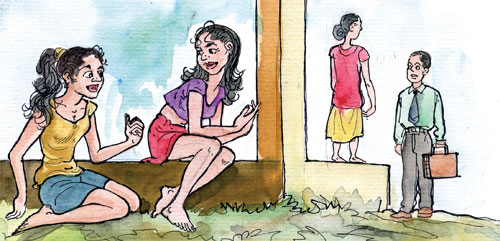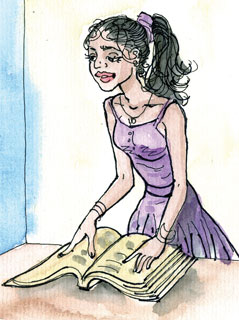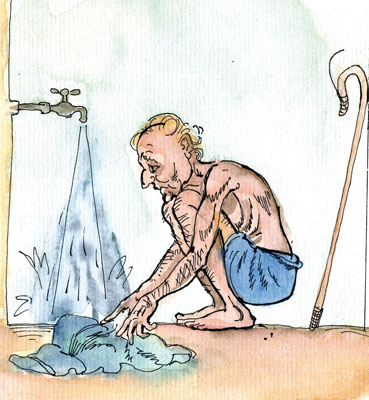|

by R. S. Karunaratne
Verbs with prepositions
With some verbs we use a preposition before an object.
Wait for me, please.
She always listens to pop music.
Some people do not believe in life after death.
If your English is poor, people will laugh at your pronunciation.
If you are getting late, I’ll wait for you.
If you want anything, just ask for it.
|

We have to look after our parents when they are old. |
This pen does not belong to me.
“Please listen to me,” the teacher said.
His father is a well-known painter. Look at those beautiful paintings.
Some people live from day to day. They don’t think about the future.
That man is really boring. He always talks about himself.
Jayani is one hour late. What has happened to her?
We arrive at or in a place.
The express train will arrive at the Fort Railway Station at 9 p.m.
We arrived in Australia last week.
It was dark when we arrived at the station.
Nimal arrived in London safely.
We arrived at the Bandaranaike International Airport.
Note
We arrive in a country.
We arrive in a city.
We arrive in a town.
We arrive at a railway station.
We arrive at a theatre.
We arrive at a cinema.
We arrive at a post office.
Get into / Get out of
We get into a taxi.
We get out of a taxi.
You get on a bus.
You get off a bus.
We get on a train.
We get off a train.
They get on a plane.
The get off a plane.
You get on a ship.
You get off a ship.
The tourist got out of the car at the Hilton.
The tourist got off the coach at the elephant orphanage.
Look after / Look for
“Look after” means “Watch and take care of”
Parents and teachers have to look after children carefully.
While living alone in a foreign country I had to look after myself.
We have to look after our parents when they are old.
Can you look after my car when I am away?
He had to look after a flock of sheep.
“Look for” means “Try to find out”
What are you looking for?
I am looking for a job.
|

I’m looking for my name in the electoral register. |
Grandfather is looking for his glasses.
I’m looking for my name in the electoral register.
[Activity]
Put in the relevant preposition and check your answers with the key.
1. Please don’t wait .......... me.
2. What time did you arrive ........... the station?
3. Please listen .......... your teacher.
4. She is looking ......... her friend’s house when he is away.
5. The tourists are looking .......... a hotel.
6. Did somebody ask ........ coffee?
7. Does this car belong ......... Anne?
8. She forgot to pay ........... the drinks.
9. I don’t want to think ........... the future.
10. The principal got ........... his car and drove away.
****************
Key:
1. for 2. at 3. to 4. after 5. for 6. for 7. to 8. for 9. about 10.
into
******************
Match words and meanings
Here’s an exciting way to enrich your vocabulary. Match the words in
column ‘A’ with their meanings in column ‘B’ and check your answers with
the key. The first has been done for you.
[Column A]
J 1. commend
... 2. comment
... 3. commentary
... 4. commentator
... 5. commerce
... 6. commit
... 7. commodity
... 8. commonplace
... 9. commotion
... 10. communicable
... 11. communicate
... 12. communique
... 13. commutation
... 14. commute
... 15. commuter
... 16. companion
... 17. companionable
... 18. companionship
... 19. company
... 20. comparable
... 21. compare
... 22. compartment
... 23. compass
... 24. compassion
... 25. compatible
[Column B]
A. an official piece of news
B. to share information with others
C. able to be given from one person to another
D. a spoken description of an event
E. a sudden short period of noise
F. happening often
G. one who gives a spoken description of an event
H. a product that can be traded
I. to do something illegal
J. to formally praise somebody or something
K. the enjoyment of spending time with others
L. an organisation which sells goods or services
M. similar in size, amount or quality
N. able to live together
O. a strong feeling of sympathy
P. a device for finding direction
Q. a separate area inside a vehicle
R. to look for the differences between two or more things
S. friendly and pleasant to be with
T. a person with whom you speak a lot
U. one who travels regularly between work and home
V. to make the same journey between work and home
W. when a punishment is made less severe
X. activities involved in buying and selling
Y. express your opinion
****************
Key:
2. Y 3. D 4. G 5. X 6. I 7. H 8. F 9. E 10. C 11. B 12. A 13. W 14. V
15. U 16. T 17. S 18. K 19. L 20. M 21. R 22. Q 23. P 24. O 25. N
****************
Starters:
‘Used’ + ‘to-infinitive’
We use ‘used’ + to-infinitive’ to say that something happened
regularly in the past.
Grandfather used to travel a lot when he was young.
We used to play cricket when we were young.
Nalan used to smoke , but he gave up the bad habit a year ago.
Grandmother used to eat meat and fish, but she never eats them now.
|

Grandfather got used to living alone after his wife's death. |
There used to be a cinema hall here, but the urban authorities
demolished it recently.
We use ‘didn't + use to’ in negatives.
We never used to have computers when we were young.
The children didn't use to swim in the river at night.
The girls never used to go out alone.
Teacher did not use to punish errant students severely.
Parents never used to leave their children unaccompanied.
We use ‘be used to + ing’ to say that something is familiar.
I am used to getting up very early.
Amara is used to working late.
Sri Lankans are not used to driving on the right.
She is not used to wearing glasses.
He was not used to dancing at parties.
We use ‘get used to’ to talk about things becoming more familiar.
You will get used to working here with strangers.
Grandfather got used to living alone after his wife's death.
[Activity]
Fill in the blanks with suitable words and check your answers with the
key.
1. He................. (live in Colombo)
..............................................
2. In those days ......................... (we / not / have)
electricity.
..............................................
3. ..................... (you / help) with the field work?
..............................................
4. As a child ................. (I / look) after a flock of sheep.
..............................................
5. Nayana .......................... (use / paint) pictures.
..............................................
6. The actor ....................... (use / sign) autographs.
..............................................
7. When I was child I ........................... (use / dream) of
being an editor.
..............................................
8. She is nervous. She is ................ (not / use / speak) in
public.
.............................................
9. It will take some time .................... (get / use / live) in
an apartment.
..............................................
10. I am not ..................... (use / drink) alcohol.
..............................................
****************
Key:
1. He used to live in Colombo.
2. Those days we didn't use electricity.
3. You used to help with the field work.
4. As a child I used to look after a flock of sheep.
5. Nayana used to paint pictures.
6. The actor is used to signing autographs.
7. When I was a child I used to dream of being an editor.
8.She is nervous. She is not used to speaking in public.
9.It will take some time to get used to living in an apartment.
10.I am not used to drinking alcohol.
********************
Quiz on idioms
An idiom is a special kind of phrase. It is a group of words which
have a different meaning when used together from the one it would have
if the meaning of each word were taken individually. Tick the meaning of
each idiom in bold type and check your answers with the key.
1. If a plan or activity goes by the board ...
(a) it is abandoned
(b) it is postponed
(c) it is suspended
2. If a political party sweeps the board in an election ...
(a) it wins a marginal victory
(b) it loses all the seats
(c) it wins all the seats
3. If something floats your boat ...
(a) you find it unattractive
(b) you find it exciting
(c) you find it dull
4. If two or more people are in the same boat ...
(a) they are in the same difficult situation
(b) they are in the same pleasant situation
(c) they are travelling in the same boat
5. If somebody is rocking the boat ...
(a) they are enjoying themselves
(b) their behaviour is likely to cause trouble
(c) they are entertaining you
6. If you receive a body blow ...
(a) something makes you very happy
(b) something makes you ill
(c) something makes you greatly disappointed
7. If you do something to keep the body and soul together ...
(a) you do it because it is the only way you can earn enough money
(b) you do it because you are compelled to do so
(c) you do it because it gives you immense pleasure
8. If you say over my dead body when somebody suggests something ...
(a) you say emphatically that you like it
(b) you say emphatically that you don't like it
(c) you say that you will consider it
9. If a situation comes to the boil ...
(a) it reaches a climax
(b) it reaches a point of no return
(c) it reaches a difficult point
10. If somebody does something bold as brass ...
(a) they do it unwillingly
(b) they do it willingly
(c) they do it without being ashamed
*****************
Key:
1. (a) 2. (c) 3. (b) 4. (a) 5. (b) 6. (c) 7. (a) 8. (b) 9. (a) 10.
(c)
***************** |

